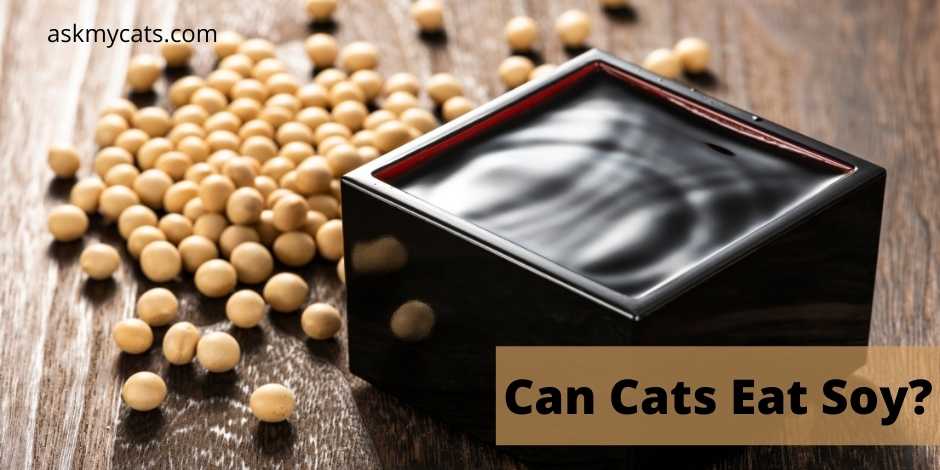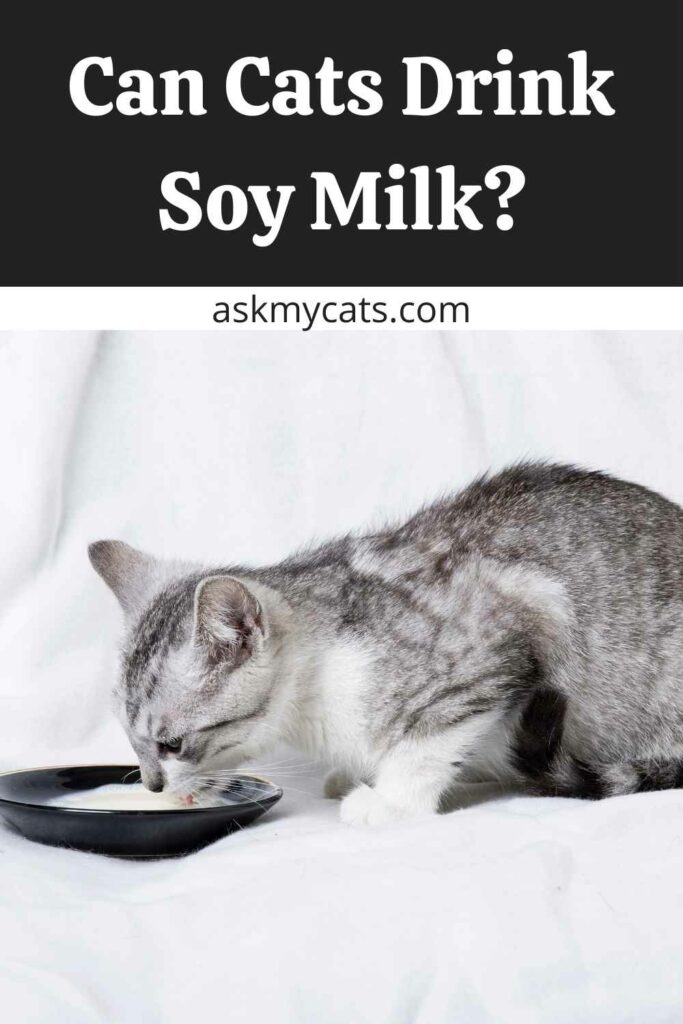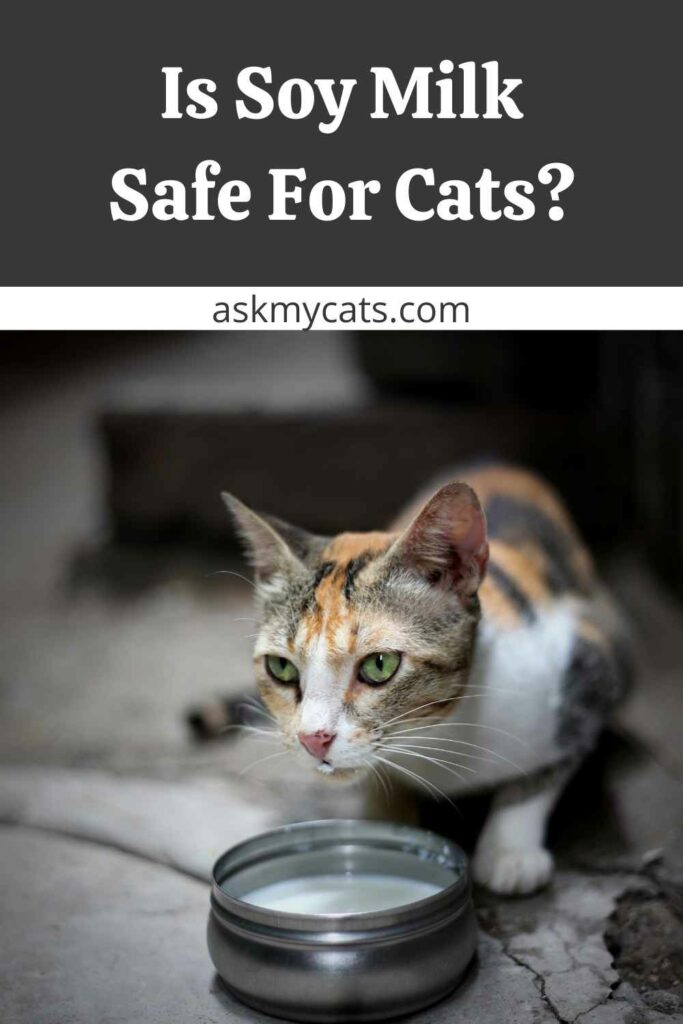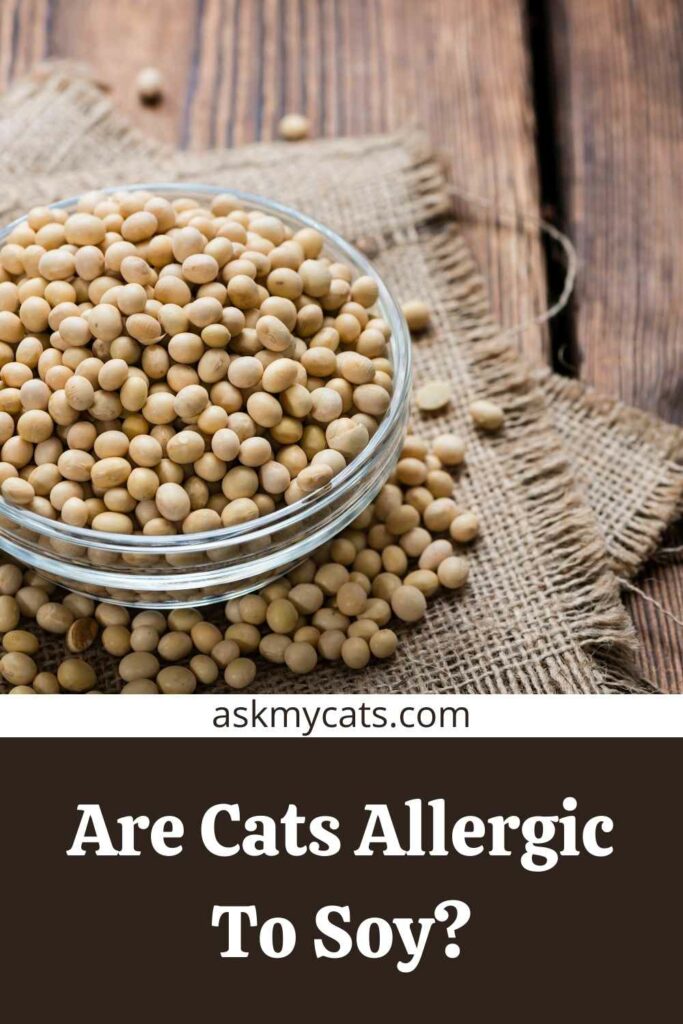Three of the diets contained soy, beef, and poultry, which are frequent antigens in cats. However, if the commercial new protein diet has no detrimental effects on the cat, it can be administered indefinitely.
Soy is indeed safe and is used as a protein component in many pet diets.
Adult cats and dogs are not meant to drink milk; therefore these are empty calories that do not provide the nutrients that the creature need. Some almond or soy milk is sweetened, which means it may contain extra sugar.


Give Your Cat the Perfect Day
Get the Free Ebook!
Can Cats Eat Soybeans?
Unless your cat has a soy allergy, you can give your cat tiny amounts of soybeans. Cooking soybeans before giving them to your cat is suggested.
Soybeans, including edamame, can cause stomach issues in cats if consumed in excess. They can, however, be good to your cat if you restrict your consumption to a minimum. They’re high in protein and isoflavone, which helps the bones retain calcium.
Many cat feeds contain soy, but bear in mind that it is prepared in such a manner that the protein is readily broken down by your cat’s digestive system.
The high protein content and well-balanced amino acid profile of soy protein concentrate make it an ideal protein source for cats. It compares the amino acid requirements of cats with the protein and amino acid composition of SPC, maize gluten meal, and chicken by-product meal.
SPC’s amino acid composition complements other protein sources in satisfying dogs’ essential amino acid requirements. Taurine can be found in animal proteins but not in vegetable proteins, thus it’s generally added as a synthetic amino acid to fulfil cats’ requirements.
Can Cats Drink Soy Milk?
No, cats should not drink soy milk. While tiny doses are unlikely to cause harm, it is still not ideal.

Even if soy milk is unsweetened, some of the sugars in it will be tough for a cat’s stomach to break down. It also has high calorie content, making it an obesity concern.
Your cat is not poisoned by soy milk, and if they sneak a few sips, it will not kill them. However, big amounts are bad for their digestive systems, thus the answer is no.
While lactose-free soy milk does contain a significant quantity of important amino acids. It also contains soybeans and a variety of nutrients that your cat may not be used to, and which, in high doses, might induce diarrhoea in your cat.
Long-life soy milk also contains artificial preservatives and sugars, allowing it to last for a long time. This isn’t good for your cat because these aren’t items he’s used to digesting.
You may be tempted to offer your cat soy milk as a special treat or to add some diversity to their diet, but you will most likely be doing more damage than good.
You should think about what all of the extra sweets and fats are doing to their diet. A little bowl of almond milk for a cat is the same as us consuming three doughnuts in one sitting – not good.
Obesity in cats is a real possibility, and it’s a common health problem. Obesity will not only impede your cat from living their optimum life, but it will also put them at risk for other life-threatening conditions including diabetes and arthritis.
Although it may be tempting to offer your cat delightful treats, the greatest thing you can feed your cat is food that comes naturally in their diet, such as fresh a little piece of fresh chicken or tuna (make sure there are no bones!) However, this should be done in moderation and in a limited quantity.
It’s crucial to remember that cats aren’t human, and they aren’t aware of the world’s hundreds of various cuisines. Cats don’t eat for the sake of eating; they eat to survive. Even if it’s tempting to share heaps of delicious human food with your cat, they aren’t losing out because they aren’t aware that it exists.
Although soy milk is reasonably safe for your cat, this does not imply you should. Again, it’s alright if your cat sneaks a few sips of nut milk now and then, but we don’t recommend providing it to your cat on a daily basis owing to the digestive problems and weight gain it might (and probably will) cause.
Is Soy Milk Safe For Cats?
No, soy milk is not safe for cats as it can cause stomach upset in cats.

Lactose (a milk sugar) has been isolated from cat milk. Lactase is the enzyme that digests lactose, and when kittens are weaned, the enzyme’s activity decreases.
As a result, when adult cats are fed cow’s milk, they get diarrhoea. This impact is frequently proportional to the amount of milk consumed; the more milk consumed, the more probable symptoms will appear.
Because soya milk does not contain lactose, it appears to be a suitable option at first. Unfortunately, anti-nutritional elements included in soya can make it difficult for cats to digest.
Stachyose and raffinose are sugars present in soya milk that, while digestible by microorganisms in the gut, are not digestible by enzymes produced by cats. As a result, cats given soya milk frequently have flatulence and digestive problems.
Another factor to remember is that milk is a food, and the more you provide, the more probable your diet will become unbalanced. This would be a key concern in the case of soya milk because cats are obligate carnivores (they require specific nutrients available only in meat) and some nutrients will not be in the form required by cats.
Are Cats Allergic To Soy?
Cats are allergic to soy and can exhibit severe allergic symptoms if he intakes large amounts of soy.

To develop a food allergy in a cat, the food must be one to which the cat has previously been exposed. An animal cannot acquire a food allergy if it has never been exposed to it.
Beef, fish, poultry, and dairy products are the foods most often related with food allergies in cats. There has been little study done in this area, and there may be additional common allergies that we haven’t discovered yet.
Itching and skin irritation are common in cats with allergies throughout the year. The face, ears, belly, groyne, armpits, and legs/paws are commonly affected by itching. Because these cats are itchy, they frequently groom themselves excessively, resulting in severe damage (wounds, abrasions) and hair loss.
Recurrent skin and ear infections are also possible in affected animals. These infections may be the only clinical indication of food allergies in some cats.
In addition to their skin problems, cats with food allergies may experience gastrointestinal symptoms such as vomiting or diarrhoea. Itching around the rectum in some cats might cause them to scoot.
Food-allergic cats may also have frequent bowel motions or strain when they defecate.
Can Cats Eat Soybean Oil?
Yes, cats can eat small measures of soybean oil.
Both dogs and cats prefer animal-based fats over soybean oil, but soy oil’s palatability is equivalent to that of other vegetable oils. Soybean oil is frequently used as control oil in nutrition studies, with little to no negative health or nutritional consequences.
Can Cats Eat Soy Protein?
Yes, cats can eat soy protein and they act as an excellent source of protein for cats.
Soy protein is a protein derived from soybeans that is occasionally given to cats as a nutritional supplement. Soy includes a variety of proteins; however isoflavones are a kind of protein found in soy that is known for its estrogenic properties.
Isoflavones may also have antioxidant, anticancer, antibacterial, and anti-inflammatory properties. Soy protein has been utilised in the treatment of obesity, metabolic illness, cancer (particularly lymphoma), and hormone-related diseases including prostatic hypertrophy and urine incontinence in animals.
Can We Give Soy Chunks To Cats?
We can give soy chunks to cats as it maintains the protein balance in cat’s body.
Too much soy can raise oestrogen and uric acid levels in the body, leading to a variety of health issues such as water retention, acne, weight gain, mood changes, bloating, and more. Uric acid overproduction might harm your liver and cause joint discomfort.
Soy is usually thought to be safe for cats to consume. Soy is used as a primary protein component in several cat diets. Because plant-based protein is less expensive than meat and eggs, it’s excellent for cat food producers looking to offer a more affordable product to their customers.
Frequently Asked Questions
Is soybean oil harmful to cats?
Soybean oil is heavy in omega-6 fats, which can be harmful to your health if eaten in large amounts. As a result, it’s recommended to restrict your cat’s use of soybean oil and replace it with a range of beneficial fats on a regular basis.
Should cats have soy?
Despite its potential advantages, soy is simply too hazardous a substance. Soy includes phytates (a 50-cent term) that prevent minerals from being absorbed and can inhibit enzymes needed to breakdown protein, regardless of where it was cultivated. This frequently results in liver damage or failure in cats.
Can cats eat textured soy protein?
Soy cannot be digested by cats in the way that pet food makers say. Soy includes phytates, a chemical that hinders mineral absorption and inhibits the enzymes required for protein digestion. As a result, the GI tract becomes inflamed, which can lead to severe diseases.
Final Words
Three of the diets contained soy, beef, and poultry, which are frequent antigens in cats. However, if the commercial new protein diet has no detrimental effects on the cat, it can be administered indefinitely.
Please leave your questions about your pet friend’s feeding habits in the comments section below. We’ll get back to you as soon as possible.

I am slightly confused on this article. It states that soy bean oil is not for cats yet then it states that it is good for cats. Would you mind clarifying for me which one it is? I do a cat rescue and I want to be sure on what oils i (.e soy bean oil), I can give them.
Hello Peter,
Soy bean oil in small quantity is ok for your cat but should be avoided in large quantity.
Happy cat parenting